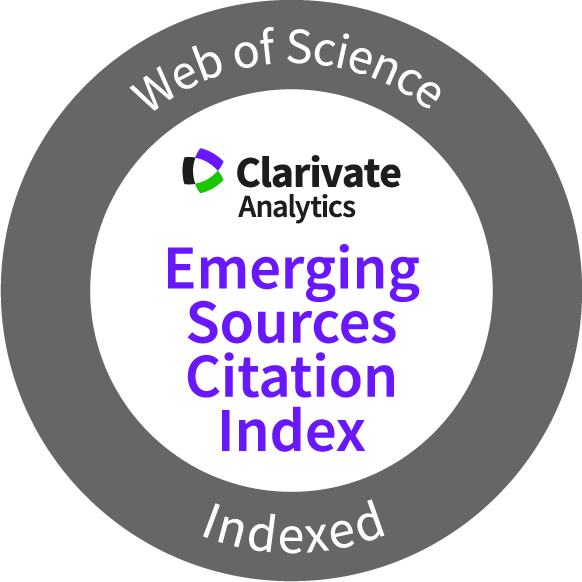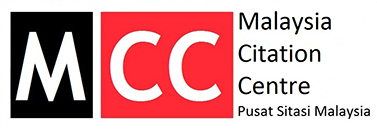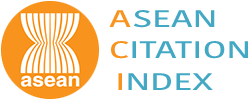PURIFICATION AND PARTIAL CHARACTERISATION OF A PROTEASE INHIBITOR FROM Mimosa diplotricha
Keywords:
Chrysomya megacephala, Mimosa diplotricha, pest control, protease inhibitorAbstract
Search for inhibitors to insect proteases is one of many strategies to control pests. Previous work has demonstrated successful purification of effective inhibitors from plant origin. Thus, the current study attempted to purify protease inhibitors from locally available medicinal plants. The study demonstrated that the ethanolic extracts of Mimosa diplotricha leaves caused a significant 80% reduction in bovine trypsin activity. The inhibitory property of the proteinaceous nature of the extract was reconfirmed through qualitative analysis using the detection of trypsin inhibitors on the SDS-PAGE technique. The ammonium precipitated trypsin inhibitor was purified using Hi-Trap G25 and resolved into a single band with a molecular weight of approximately 20.8 kDa. By using the Dixon plot the competitive inhibitor has a Ki value of 2.16 × 10-4 mM. The purified protein inhibited the protease extract of Chrysomya megacephala at IC50 of 28 μg/mL. The results highlighted the presence of trypsin inhibitor in Mimosa diplotricha and its potential as a pest control agent.
Downloads
Metrics
References
Arindam, B. & Cherukuri, R.B. 2009. Purification and biochemical characterization of a serine proteinase inhibitor from Derris trifoliata Lour. seeds: Insight into structural and antimalarial features. Phytochemistry, 70: 703-712. DOI: https://doi.org/10.1016/j.phytochem.2009.04.001
Azzouz, H., Campana, E.D.M. , Cherquia, A., Sagueza, J., Coutya, A., Jouaninb, L., Giordanengoa, P. & Kaiserc L. 2005. Potential effects of plant protease inhibitors, oryzacystatin I and soybean Bowman-Birk inhibitor, on the aphidparasitoid Aphidius ervi Haliday (Hymenoptera, Braconidae). Jounal of Insect Physiology, 51: 941–951. DOI: https://doi.org/10.1016/j.jinsphys.2005.04.009
Babu, S.R., Subrahmanyam, B., Srinivasan, & Santha, I.M. 2012. In vivo and in vitro effect of Acacia nilotica seed proteinase inhibitors on Helicoverpa armigera (Hǜbnere) larvae. Jounal of Biosciences, 37: 269-276. DOI: https://doi.org/10.1007/s12038-012-9204-8
Boulter, D. 1993. Insect pest control by copying nature using genetically engineered crops. Biochemistry, 34: 1453-1466. DOI: https://doi.org/10.1016/S0031-9422(00)90828-8
Bowman, D.E. 1946. Differentiation of soybean antitryptic factor. Proceedings of the Society for Experimental Biology and Medicine, 63: 547-550. DOI: https://doi.org/10.3181/00379727-63-15668
Bradford, M.M. 1976. A rapid and sensitive method for quantitation of microgram quantities of protein utilizing the principle of protein-dye-binding. Analytical Biochemistry, 72 : 248-254. DOI: https://doi.org/10.1016/0003-2697(76)90527-3
Brillard-Bourdet, M., Hamdaoui, A., Hajjar, E., Boudier, C., Reuter, N., Ehret-Sabatier, L., Bieth, J.G. & Gauthier, F. 2006. A novel locust (Schistocerca gregaria) serine protease inhibitor with a high affinity for neutrophil elastase. Biochemical Journal, 10: 467-476. DOI: https://doi.org/10.1042/BJ20060437
Bushell, G.R., Ghosh, P. & Hanspal, J.S. 1983. Detection of protease inhibitors using substrate-containing sodium dodecyl sulphate polyacrylamide gel electrophoresis. Analytical Biochemistry, 132: 288–293. DOI: https://doi.org/10.1016/0003-2697(83)90010-6
Chaudhary, N.S., Shee, C., Islam, A., Ahmad, F., Yernool, D., Kumar, P. & Sharma, A.K. 2008. Purification and characterization of a trypsin inhibitor from Putranjiva roxburghii seeds. Phytochemistry, 69: 2120-2126. DOI: https://doi.org/10.1016/j.phytochem.2008.05.002
Christeller, J.T. 2005. Evolutionary mechanisms acting on proteinase inhibitor variability. The FEBS Journal, 272: 5710–5722. DOI: https://doi.org/10.1111/j.1742-4658.2005.04975.x
De Leo, F., Volpicella, M., Licciulli, F., Liuni, S., Gallerani, R. & Ceci L.R. 2002. Plant-PIs: a database for plant protease inhibitors and their genes. Nucleic Acids Research, 30: 347–348. DOI: https://doi.org/10.1093/nar/30.1.347
Delledonne, M., Allegro, G., Belenghi, B., Balestrazzi, A., Picco, F., Levine, A., Zelasco, S., Calligari, P. & Confalonieri, M. 2001. Transformation of white poplar (Populus alba L.) with a novel Arabidopsis thaliana cysteine proteinase inhibitor and analysis of insect pest resistance. Molecular Breeding, 7: 35–42. https://doi.org/10.1023/A:1009605001253 DOI: https://doi.org/10.1023/A:1009605001253
Fan, S.G. & Wu, G.J. 2005. Characteristics of plant proteinase inhibitors and their applications in combating phytophagous insects. Botanical Bulletin of Academia Sinica, 46: 273–292.
Heath, R.L., Barton, P.A., Simpsom, R.J., Reid, G.E., Lim, G. & Anderson, M.A. 1995. Characterization of the protease processing sites in a multidomain proteinase inhibitor precursor from Nicotina alata. European Journal of Biochemistry, 230: 250-257. DOI: https://doi.org/10.1111/j.1432-1033.1995.0250i.x
Hilder, V.A., Gatehouse, A.M.R., Sheerman, S.F., Barker, R.F. & Boulder, D. 1987. A novel mechanism of insect resistance engineered into tobacco. Nature, 330: 160–163. DOI: https://doi.org/10.1038/330160a0
Jennings, C., West, J, Waine, C., Craik, D. & Anderson, M. 2001. Biosynthesis and insecticidal properties of plant cyclotides: The cyclic knotted proteins from Oldenlandia affinis. Proceedings of the Academy of Science USA, 98: 10614-10619. DOI: https://doi.org/10.1073/pnas.191366898
Jongsma, M.A., Bakker, P.L., Peters, J., Bosch, D. & Stiekema, W.J. 1995. Adaptation of Spodoptera exigua larvae to plant proteinase inhibitors by induction of gut proteinase activity insensitive to inhibition. Proceedings of the Academy of Science USA, 92: 8041-8045. DOI: https://doi.org/10.1073/pnas.92.17.8041
Kanwar, S.S. & Gupta, S. 2021, Plant protease inhibitors and their antiviral activities - Potent therapeutics for SARS CoV-2. Journal of Infectious Diseases and Treatment, 7:5205-5212.
Kunitz, M. 1946. Crystalline soybean trypsin inhibitor. Journal of General Physiolology, 29: 149-154. DOI: https://doi.org/10.1085/jgp.29.3.149
Laemmli, U.K. 1970. Cleavage of structural proteins during the assembly of the head bacteriophage T4. Nature, 277: 680-685. DOI: https://doi.org/10.1038/227680a0
Neuhoff, V., Arold N., Taube D. & Ehrhardt W. 1988. Improving staining of proteins in polyacrylamide gels including isoelectric focusing gels with clear background at nanogram sensitivity using Coomassie Brilliant Blue G-250 and R-250. Electrophoresis, 9: 255-262. DOI: https://doi.org/10.1002/elps.1150090603
Ryan, C.A. 1990. Protease inhibitors in plants: genes for improving defenses against insects and pathogens. Annual Review Phytopathology, 28: 425–449 DOI: https://doi.org/10.1146/annurev.py.28.090190.002233
Published
How to Cite
Issue
Section
Any reproduction of figures, tables and illustrations must obtain written permission from the Chief Editor (wicki@ukm.edu.my). No part of the journal may be reproduced without the editor’s permission





















